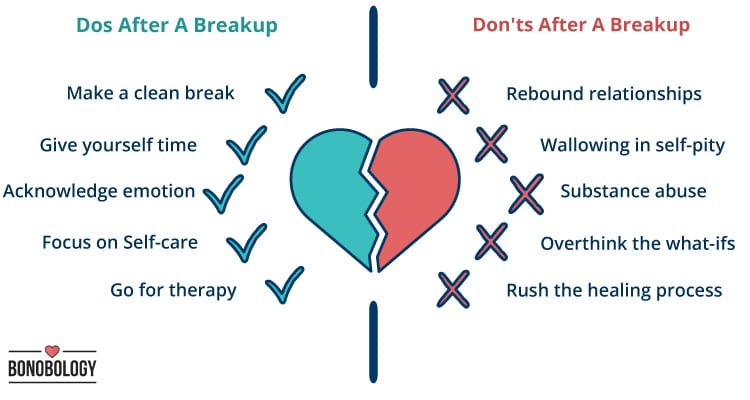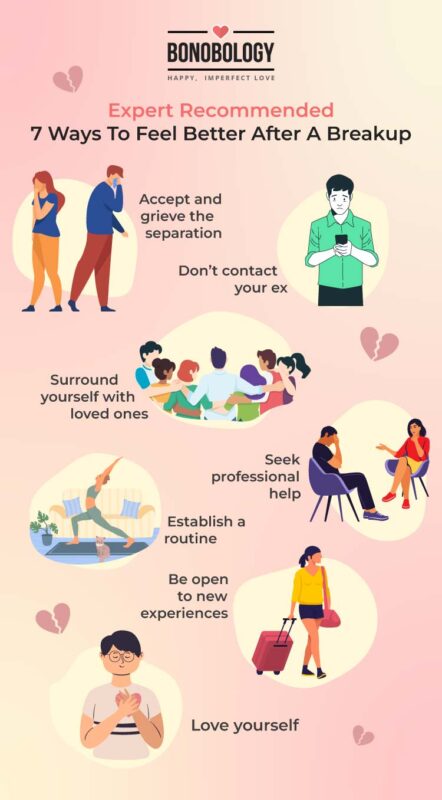
Understanding the Emotional Impact of a Breakup
Recognizing and Accepting Your Feelings
Navigating the emotions after a breakup can feel overwhelming. It’s essential to recognize and accept these feelings as they arise. This may include sadness, anger, confusion, and even relief. Understanding that these emotions are valid and part of the healing process can help. Journaling can be a powerful tool here:
- Write down what you feel daily.
- Note specific triggers that stir these emotions.
- Allow yourself the space to vent without judgment.
By identifying your feelings, you can start untangling the complexities of your emotional landscape.
Dealing with Grief and Loss
Grieving a relationship is akin to mourning a loss. Each individual experiences grief differently, and there’s no timeline for healing. Practical strategies can ease this process:
- Give yourself permission to grieve: It’s okay to cry or feel sad.
- Connect with your feelings: Reach out to a trusted friend or family member to share your thoughts.
- Engage in meaningful activities: Whether it’s art, sports, or volunteering, find outlets that uplift you.
Recognizing that grief is part of the human experience can foster resilience and hope.
Managing Emotional Triggers
Certain memories, places, or items can trigger deep emotional responses. Here’s how to manage these triggers effectively:
- Identify triggers by keeping a list.
- Create a plan for dealing with them when they arise. For example, if seeing a particular restaurant reminds you of your ex, plan to avoid it until you feel stronger.
- Mindfulness practices can also help. When a trigger occurs, take a moment to breathe and observe the feeling without judgment, allowing it to pass.
By understanding and managing these emotional ups and downs, a path toward healing becomes clearer, helping one move forward with renewed strength.

Self-Care and Healing Practices
Engaging in Physical Activities
One of the most effective ways to cope with the emotional toll of a breakup is by engaging in physical activities. Exercise releases endorphins, which are natural mood lifters. Whether it’s a brisk walk in the park or a high-energy dance class, finding an activity that resonates can make a world of difference. Consider these options:
- Join a local sports team: It’s a great way to connect with others and boost your mood through camaraderie.
- Try yoga or Pilates: These practices not only engage your body but also promote relaxation and mindfulness.
- Set fitness goals: Whether it’s running a 5k or mastering a new yoga pose, having goals can provide a sense of purpose.
Practicing Mindfulness and Meditation
Incorporating mindfulness and meditation into your daily routine offers a calming respite from heartbreak. It allows you to reconnect with yourself and create space for healing. Begin with short sessions and gradually increase:
- Guided meditation: Use apps to help you get started; even five minutes can be beneficial.
- Breathwork: When emotions become overwhelming, take a moment to focus solely on your breath, grounding yourself in the present.
Seeking Support from Friends and Family
Don’t underestimate the power of supportive relationships. Surrounding yourself with friends and family can provide the emotional nourishment you need. Reach out to those you trust, share your feelings, and lean on them during tough moments. Here are some ways to connect:
- Plan regular catch-ups: Whether it’s coffee or virtual hangouts, these moments strengthen bonds.
- Join a friend for activities: Movie nights or cooking together can bring joy and divert your mind from negative thoughts.
By embracing self-care practices and leaning on those around you, the journey through healing becomes more manageable and fulfilling.

Reflecting and Learning from the Experience
Analyzing the Relationship Dynamics
After a breakup, taking the time to analyze the dynamics of the relationship can be incredibly enlightening. Reflecting on what worked and what didn’t can provide insights that are key to personal growth. Consider these questions:
- What were the strengths in your relationship?
- Were there recurring conflicts?
- How did you communicate your needs?
For example, if consistent disagreements about future plans caused friction, identifying this pattern allows you to approach future partnerships with clearer communication.
Setting Personal Boundaries
Once you’ve reflected on past experiences, setting personal boundaries becomes vital for your emotional health. Boundaries are essential for protecting your wellbeing and fostering healthier relationships moving forward. Here’s how to establish them:
- Clearly define your limits: Determine what behaviors are acceptable and which are not, both for yourself and others.
- Communicate your needs: Don’t shy away from expressing your boundaries to friends and future partners.
- Practice self-advocacy: Remember, saying “no” is perfectly okay, and prioritizing your needs is crucial.
Embracing Growth and Self-Discovery
Finally, embrace this time as an opportunity for self-discovery and growth. Breakups often serve as catalysts for personal transformation. Try engaging in new hobbies or interests that redefine your sense of self:
- Take a class: Explore areas of interest, from cooking to painting.
- Travel or explore your surroundings: New experiences can provide fresh perspectives and rejuvenate your spirit.
As you navigate this journey of reflection and learning, keep in mind that each experience contributes to your stronger, more resilient self. Ultimately, these insights will lay the foundation for healthier relationships in the future.
.jpg)
Moving Forward and Building a Positive Future
Setting New Goals and Priorities
With reflection in mind, it’s time to focus on the future by setting new goals and priorities. Establishing what you want to achieve can provide a renewed sense of purpose post-breakup. Start by defining short-term and long-term goals:
- Personal Development: Consider goals like reading a certain number of books each month or learning a new skill.
- Career Aspirations: Think about where you see yourself in the next three years and how you can push towards that path.
- Health and Fitness: Set targets for physical activities, whether it’s running, yoga, or simply taking daily walks.
By prioritizing these goals, you shift your focus from past hurts to aspirations, allowing for a personal renaissance.
Rediscovering Your Identity
Breakups often lead individuals to drift from their sense of self. Now is the perfect time to rediscover who you are outside of a relationship. Take a moment to reflect on your interests and passions:
- Try new hobbies: Engage in activities that excite you, from painting to hiking.
- Journal your feelings: Document your thoughts and transformations; this helps you reconnect with your true self.
Celebrating your individual identity not only enhances self-esteem but helps you understand what you truly desire in future relationships.
Opening Yourself to New Relationships
As you embark on this journey of self-discovery, remain open to new relationships, whether platonic or romantic. Building connections is essential for fostering community and support. Here’s how to ease into new interactions:
- Attend social events: Join clubs or groups that reflect your interests.
- Utilize online platforms: Dating apps or local meet-up groups can introduce you to new people.
- Be patient with the process: Allow connections to develop naturally without rushing into anything.
With a solid understanding of your goals, identity, and openness to new relationships, moving forward becomes not just a possibility, but an exciting adventure filled with potential for joy and fulfillment.

Seeking Professional Help and Guidance
Therapy and Counseling Options
As you navigate the emotional terrain post-breakup, seeking professional help can be a game changer. Therapy provides a safe space to explore your feelings and gain insights into your behaviors. Here are a few options to consider:
- Individual Therapy: A licensed therapist can help you work through feelings of grief and develop coping strategies tailored to your situation.
- Cognitive Behavioral Therapy (CBT): This evidence-based approach focuses on changing negative thought patterns, which can be especially effective after a breakup.
- Couples Therapy: If you’re still grappling with unresolved feelings about your ex, talking things over with a professional can help bring clarity.
Joining Support Groups
Sometimes, sharing experiences with others who have gone through similar struggles can be incredibly validating. Joining a support group can foster a sense of community and connection. Benefits include:
- Shared Experience: Hearing others’ stories can provide reassurance that you’re not alone.
- Peer Support: You’ll find comfort among individuals who truly understand the emotional rollercoaster you’re experiencing.
- Accountability: Being part of a group can help you stay committed to your healing process.
Exploring Self-Help Resources
In addition to therapy and support groups, numerous self-help resources are available. These tools can complement your healing journey. Consider:
- Books and Podcasts: Look for titles about personal growth and relationships that resonate with your experience.
- Online Courses: Many platforms offer courses on emotional wellness, mindfulness, and resilience.
- Mobile Apps: Mental health apps can provide daily inspiration and exercises to aid in your journey.
By seeking professional help, joining supportive communities, and utilizing self-help resources, you take proactive steps towards healing and nurturing a more positive outlook for the future. This process can build resilience and provide you with the tools needed to thrive in the next chapter of your life.
